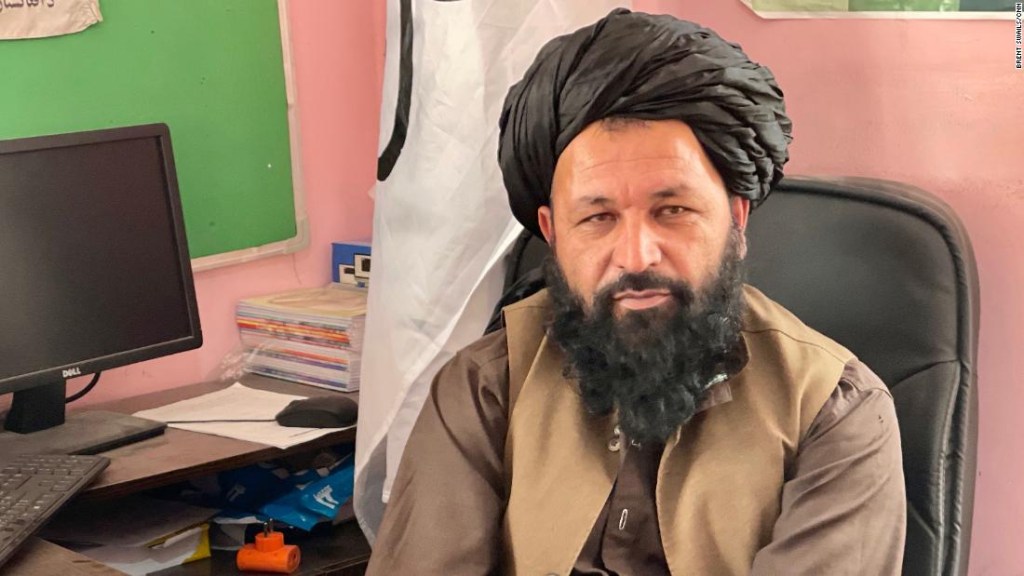This is how women challenge the Taliban in Afghanistan 8:26
Ghazni, Afghanistan (CNN) -
The bloodstained bodies of the four accused of kidnapping were hung from construction cranes with heavy chains, one of them with a warning sign around his neck: "Kidnappers will be punished like this."
In the public spaces of the western Afghan city of Herat, crowds squinted at the sun, staring at the lifeless figures.
Adults recorded and photographed with their mobile phones, while young children climbed on the edge of the fountain, just below one of the bodies, to get a better view.
"People are very happy with this decision," one of the passersby, Mohammed Mansour, told CNN.
"Because people believe that by doing this they can eliminate kidnapping in this province."
Pakistani Prime Minister Imran Khan Says "Give Taliban Time" on Human Rights Issues
Under the previous government, corruption was rampant and crime rates were high.
Since they toppled the US-backed administration and seized power in August, the Taliban have won the approval of many for delivering swift, albeit brutal, justice in the strict interpretation of the Sharia group.
In another incident, just after the group took control of the city, two suspected criminals paraded before a booing crowd, with painted faces, a punishment the Taliban prefer for petty thieves.
Just over a month after most of the international community left Afghanistan on evacuation flights, the lurid brutality in Herat is reminiscent of the previous reign of the Taliban in the late 1990s, when grim public deterrence measures they were common.
advertising
But the Taliban are also smart enough to know how the rest of the world views these medieval exhibits.
New guide for the police
In Ghazni, a strategic city on the Kabul-Kandahar highway, the much-feared religious police have returned to the streets, but instead of meting out punishments, they are pursuing a positive publicity strategy, with the intention of shaking hands and introducing themselves. .
In a recent patrol of the market, the police gathered the merchants to encourage them to follow the Sharia.
"Treat your women according to Islamic law," one commander told a crowd of merchants, "and make sure they cover themselves."
A Taliban fighter waits outside an electronics store in Ghazni.
Nearby, a man casually smokes a cigarette, a crime punishable under the previous regime, but that day, the act was ignored by the police.
The Taliban converted the pink-walled building of the Ghazni Women's Ministry into the new headquarters of the Ministry for the Propagation of Virtue and Prevention of Vice.
When a CNN team arrived, the men were still settling in, carrying a Taliban flag to the central office where director Mawlavi Abdullah Mohammad now stands.
He said their role is to encourage the Afghan population to adopt the Islamic regime and that there are strict rules on how they can do so.
Mawlavi Abdullah Mohammad.
"We [act] in accordance with the Sharia," Mohammad said.
"First, we inform people about good deeds. We preach and convey the message to them in a kind way; the second time we repeat it, again; the third time we speak to them with some harshness."
What is the sharia law under which the Taliban rule Afghanistan?
He carries a blue brochure, just released by the Taliban, which provides guidelines to the religious police on how to do their job.
"We respect the laws and regulations. We give advice, but grabbing someone's hand, hitting them, sending them a warning or a warning letter, is against the policy of the Emirate. If someone has done this, it is an act of aggression. "Mohammad said.
Ghazni's busy main market.
When asked about a recent edict in Helmand province that barbershops could be penalized for shaving men's beards, he produced a document from the Taliban leadership condemning the decree.
Taliban ban beard shaving in Afghan province 1:00
But away from the public eye, not all Taliban follow the new guidelines, and abuses are common.
In a safe place in Kabul, Wahid shows the bruises on his back, still visible days after being attacked.
His name was changed for his protection.
He recounts that a group of Taliban fighters detained him at a busy roundabout for wearing Western-style clothing.
"I had photos on my phone related to gay men," Wahid said.
The fighters searched his phone, found the photos and discovered that he was gay.
Wahid said they started beating him, first with a whip and then with a stick.
"They covered my mouth and also told me not to make a noise and that if I did they would hit me even more, so I had to endure the pain and not scream," he said.
Countries where unions between same-sex couples are legal
Life for homosexuals was always difficult and dangerous in Kabul, Wahid said, and beatings by Afghan police under the previous government were also common.
But he said he is now too scared to leave the house and worries that he will end up dead.
"Now I am afraid to dress like before, because they told me that if they see me again with that type of clothes or if I have a mobile phone with photos, they will kill me," he said.
But justice appears to be only one way, and despite the new image carefully cultivated by the Taliban, Wahid believes that the movement, born out of conflict, remains brutal at its core.
"When they beat me, they kept saying that I was gay and that I had to be killed," Wahid said.
"They had very scary faces. They enjoyed hitting me."
Taliban

